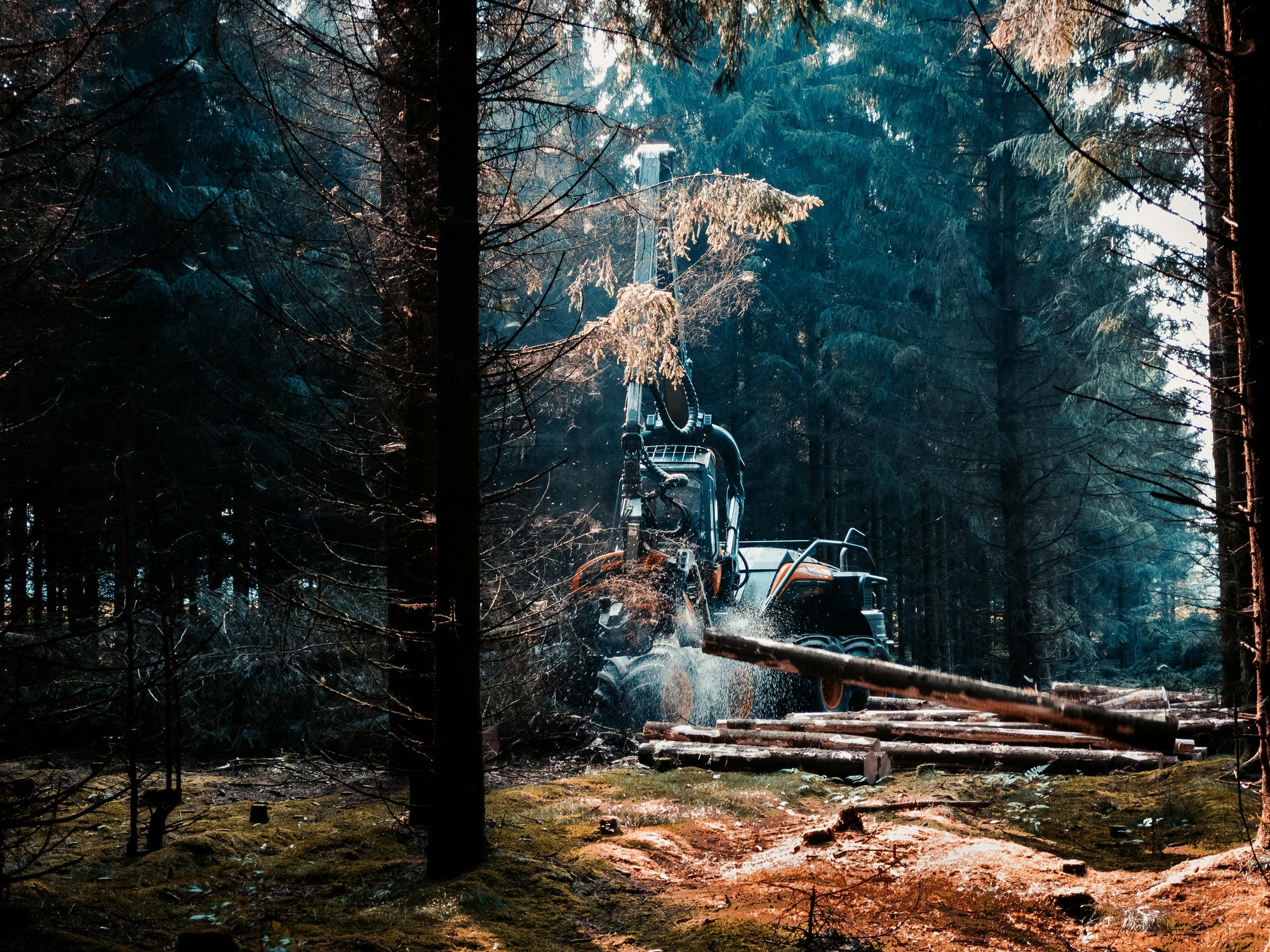Getting the best performance out of your forestry mulcher comes down to picking the right mulcher teeth. The type of vegetation, terrain, and your machine all play a role in what works best. As the exclusive distributor for M&S Gruseck at Werewolf Parts, we offer high-quality, German-made mulcher teeth built to be the best.
We focus on providing parts that match or exceed OEM standards, giving you reliable performance without overpaying. This guide breaks down the different types of mulcher teeth and how to choose the right ones for your job.
Understanding Mulcher Tooth Types
Choosing between carbide hammers and forged knives is like using the two sides of an axe. The back side of an axe, while having sharp corners, still has a flat face, making it a much more blunt tool for cutting. It can still split wood, but it takes more force. The sharp side of the axe, on the other hand, has a small, refined edge that is designed for slicing through wood with ease.
Both sides of the axe can get the job done, but one requires more effort, while the other demands more maintenance to keep its edge sharp. The same applies to mulcher teeth:
-
Carbide Hammers are like the blunt side of an axe—built for durability and impact resistance, they rely on force to break down material and hold up well in tough conditions.
-
Forged Knives are like the sharp side of an axe—designed for precision cutting, they slice through wood and brush efficiently but require regular sharpening to stay effective.
Now, let’s take a closer look at each type and how they perform in different conditions.
Carbide Hammers: Built for Durability
Carbide hammers are the heavy hitters of the cutting world. These tools have extremely hard, wear-resistant edges, making them ideal for rocky, abrasive terrain and harsh conditions. They excel in land clearing, right-of-way maintenance, and other high-impact applications where durability is key.
Key Advantages:
-
Extremely durable – Carbide-tipped teeth withstand repeated impacts, making them ideal for tough terrain with rocks and hard debris.
-
Low maintenance – Unlike forged knives, carbide teeth don’t need regular sharpening. You can run them for extended periods without much upkeep.
-
Handles tough jobs – Great for heavy-duty mulching where raw power is needed over fine-cutting precision.
The trade-off? Carbide hammers don’t slice as cleanly as forged knives, meaning they take more power and time to process thick wood. However, their longevity and resilience make them the go-to choice when conditions are unpredictable or demanding, especially when higher horsepower is used.
Forged Knives: Precision Cutting with High Efficiency
Forged knives have a sharp cutting edge, making them ideal for all types of wood and heavy brush. Like a chainsaw blade, they cut through thick vegetation with ease, handling everything from dense hardwood to tangled brush. They produce finer mulch than carbide hammers, making them a solid choice when a clean finish is important.
Key Advantages:
-
Fast, efficient cutting – The sharp edge allows for quick, clean cuts, reducing the strain on the mulcher and improving fuel efficiency.
-
Ideal for wood and brush – Designed to handle everything from softwoods to thick tree trunks with precision.
-
Leaves a fine mulch – Unlike carbide hammers, forged knives create small wood chips and minimal debris, leaving behind a neat, finished look.
While forged knives don’t wear down particularly fast, they do wear faster than carbide teeth and require periodic sharpening to stay at peak performance. They trade longevity for efficiency, offering a faster, cleaner cut in exchange for more maintenance.
Matching Mulcher Teeth to the Job
Different terrains and job types call for different teeth:
-
Rocky or Hard Ground: Carbide teeth are the best option since they can handle impact and wear.
-
Soil contact & Light Brush: Carbide teeth provide a cost-effective solution for less demanding applications. Knives are also an option.
-
Dense Vegetation & Thick Trees: Forged knives deliver better cutting performance, better chip size, speed of cut, and wear and tear on equipment.
A mix of both types can improve performance in mixed-terrain conditions. Running carbide teeth on the outer edges of the rotor and forged knives in the center can help balance cost and effectiveness. Just make sure to use equal numbers of each to keep the rotor balanced and avoid excessive vibration or noise.
Installation & Maintenance Tips
Keeping your mulcher teeth in good shape ensures better performance and a longer lifespan:
-
Install teeth securely, following the manufacturer’s torque specs.
-
Check regularly for loose, damaged, or missing teeth to keep everything running smoothly.
-
Rotate teeth periodically for even wear.
-
Replace worn-out teeth as needed.
-
Sharpen forged knives often to maintain cutting performance.
-
Avoid hitting rocks and hard surfaces whenever possible.
-
Clean the mulcher head after each use to prevent debris buildup.
-
Use high-quality replacement teeth from a trusted supplier like Werewolf Parts.
Regular maintenance helps reduce downtime, improves efficiency, and prevents unnecessary wear on your machine.
Werewolf Parts: Your Forestry Mulching Partner
Werewolf Parts carries a wide range of mulcher teeth that fit popular forestry mulchers like FAE, CAT, Prinoth, Denis Cimaf, and more. We’re here to help with expert advice and top-quality products to keep your mulcher performing at its best. Check out our selection or reach out for guidance on what works best for your needs.

